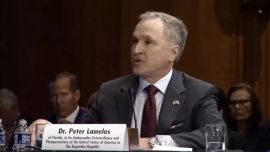The wheel seems to have turned full circle from around 30 months ago. Back then the virtual president-elect was sitting Buenos Aires City mayor Horacio Rodríguez Larreta preaching the need for consensus politics to command support of at least 70 percent in order to implement long overdue structural reforms. But then he started to be displaced by the hawks under Patricia Bullrich (winner of over half this city’s senatorial votes last Sunday) presenting change as an all-or-nothing proposition, carried one step further by an eventually victorious anarcho-capitalist libertarian Javier Milei. Only now to find himself riding last Sunday’s stunning midterm victory to appeal to provincial governors for consensus in order to advance structural reforms at long last.
These structural reforms are invariably listed as overhauls of labour law, taxation and the pension system in that order of implementation with a blueprint already emerging for the former. This promises lengthy negotiations with no assurance of convincing companies to formalise the underground economy to any significant extent if successful but this is not the biggest challenge facing Milei’s transformation drive. Tax reform faces the fundamental dilemma of how to square the circle between maintaining a fiscal surplus which is non-negotiable (not to mention an electoral hit in taming inflation) and negotiations with the provincial governors which will inevitably entail some relaxation of that fiscal discipline. To which should be added the factor that in order to be at all meaningful, reform should not merely shuffle or simplify but significantly reduce the tax burden, which would make a fiscal surplus more uphill – Milei could hardly ask governors to sacrifice the gross earnings levy which is such a huge slice of provincial revenues without shedding other fetters on the productive sector such as farm export duties and the cheque tax.
One intriguing question is whether Milei’s conversion to civilised political dialogue stems from sincere conviction, common sense or the conditions imposed by his maxi-creditors – the United States Treasury whose bailout contributed so massively to the electoral turnaround by keeping the financial crisis under control and the International Monetary Fund (IMF).
Yet whatever his motives, Milei is pushing at an open door with the governors who lost out to the purple juggernaut in most provinces (including by far the three most important: Buenos Aires, Córdoba and Santa Fe). Milei won by default because the opposition failed to come up with any natural leader or any programme beyond stopping him – not even the previously victorious Buenos Aires Province Governor Axel Kicillof now embroiled in a blame game over the defeat. Ex-president Cristina Fernández de Kirchner faults him for a strategic blunder in advancing the provincial elections at the expense of the national midterms, thus winning a battle and losing the war, while she herself is criticised for her choice of candidates for a list top heavy with La Cámpora militants and trade unionists as well as the controversial social activist Juan Grabois. This crossfire compounds an image of defeat which masks the fact that the Peronists (who topped 40 percent in Buenos Aires Province for the first time in two decades) were not so much the losers of this highly polarised election as the minor parties.
Indeed these elections were so dominated by La Libertad Avanza and Fuerza Patria plus its allies that it is easy to lose sight of the fact that their combined votes fell well short of half the electorate. The almost 13 million citizens who did not feel represented by any of the parties far outnumbered the 9.3 million voting purple or the 7.2 million Peronist and there is a case for saying that this year’s electoral process has been defined by those taking no part in it – Kicillof voters from last September stayed home last Sunday when previous absentees came out to vote for Milei rather than the differences between the two elections (47-33 percent in Buenos Aires Province in September versus both on either side of 41 percent last Sunday) meaning any direct vote switch on the part of around seven percent of the electorate.
The government in particular and those citizens fearing a total collapse in general can breathe a huge sigh of relief (the need for which might well have been a prime factor in Milei’s triumph) with the crystal-clear conclusion of a smooth electoral process aided by the single paper ballot but if disaster can turn into triumph in seven weeks, what guarantees against a similar reversal of fortune next time around? Milei has a challenging two years ahead.


















Comments